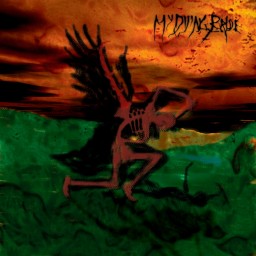 Review by Ben for My Dying Bride - The Dreadful Hours (2001)
Review by Ben for My Dying Bride - The Dreadful Hours (2001)
This is one hour that's far from dreadful. A stunning album that's awfully close to the band's best work.
My Dying Bride was back in the good books of their fans after 1999’s The Light at the End of the World returned their sound to the death doom metal of yesteryear. Their evolution over the past few years had taken them a fair distance from their roots with 34.788%...Complete perhaps pushing things further than many were willing to go. Whether the band would still find consistent inspiration producing music in a style they’d decisively left behind was yet to be seen, but 2001’s The Dreadful Hours not only suggested that it was possible, it made the irrefutable declaration that My Dying Bride’s best years were not a thing of the past. After an abnormal period of line-up changes, things were finally settling down with no departures in between the band’s sixth and seventh albums. In fact, after recording The Light at the End of the World with Andrew Craighan handling all guitar duties, they recruited Hamish Glencross from Solstice to bring the official line-up back to five (Aaron on vocals, Andrew and Hamish on guitars, Adrian on bass and Shaun on drums). They still hadn’t found a full time replacement for keyboard and violin performer Martin Powell who’d left the band in 1998, so Jonny Maudling from Bal-Sagoth once again helped out with session keyboards for The Dreadful Hours album.
While I found a lot to enjoy on The Light at the End of the World, there were certainly some areas that needed to be tightened up. In particular, the transitions between slower, melancholic phases and aggressive, death metal infused sections were far from seamless, and some of that brutality seemed to be included as an afterthought rather than part of an inspired package. Yet while it appeared that The Light at the End of the World was slightly rushed in an attempt to quickly recover lost ground, it’s obvious that The Dreadful Hours was meticulously crafted with attention paid to all aspects by a strong unit. The end result is a bunch of beautiful compositions that flow through varying moods without dropping the quality or losing their grip on the listener. Right from the tender rain accompanied opening of the title track through to the close of re-recorded classic The Return to the Beautiful, The Dreadful Hours finds My Dying Bride at the top of their game, with all of the miserably despondent elements we’ve come to expect and love, yet with none of the misadventures or uncomfortable instances that occasionally tarnish their work. It’s an album I feared they would never make after their lengthy diversion and despite my enjoyment of everything they’ve produced to varying degrees, The Dreadful Hours feels like home.
As is the norm for latter day My Dying Bride, the production is excellent and there are great performances by all involved. Andrew and Hamish immediately clicked together and the whole album is filled with crushing doom riffs and gorgeous melodies. There’s actually a lot of variety in their techniques throughout yet it’s all held together by wonderfully melancholic glue. Jonny Maudling had stayed relatively in the background on the last couple of albums, happy to support the band’s sound without drawing attention to his symphonic layers. His role is far more effective and evident on The Dreadful Hours and tracks like My Hope, the Destroyer are very heavily based around his stirring work. Of course its way more subtle than what he produces for his full time band Bal-Sagoth, but with each successive My Dying Bride session, he seemed to gain more confidence in this environment and had more impact. The Dreadful Hours is also right up there with the best work of Aaron’s illustrious career and certainly his strongest since Turn Loose the Swans. He manages to produce real emotional weight throughout without breaking into overly melodramatic pulp. He uses clean vocals the majority of the time which are both compelling and touching, while his growls are far more brutal than anything he’d produced since the early years.
Speaking of early years, I wouldn’t normally be too thrilled with the bands decision to re-record a track as part of a full length studio album. I feel that sort of thing should be limited to EPs and compilations, or at the very least listed as a bonus track. When it comes to The Return of the Beautiful, I’m willing to forgive My Dying Bride because it’s just so damn good. The original was the highlight off their debut album As the Flower Withers back in 1992 and this version improves upon it in many ways. The increase in production qualities as well as the small variation to details, including a fantastic climax where the song breaks down to what appears to be The Bitterness and the Bereavement in the distance, make it not only a hugely nostalgic trip, but an album highlight. If anything it gives those fans that decry the debut for being primitive something to think about, as this track shows how ambitious and complex My Dying Bride were even in their infancy. Other highlights are the title track, The Raven and the Rose, the bass driven Le Figlie Sella Tempesta, A Cruel Taste of Winter and the huge My Hope, the Destroyer. I’m not going to go so far as stating that The Dreadful Hours is My Dying Bride’s best album, but there’s no doubt in my mind that it deserves a full five star rating. Glorious, gloomy despondency from the masters of death doom!
